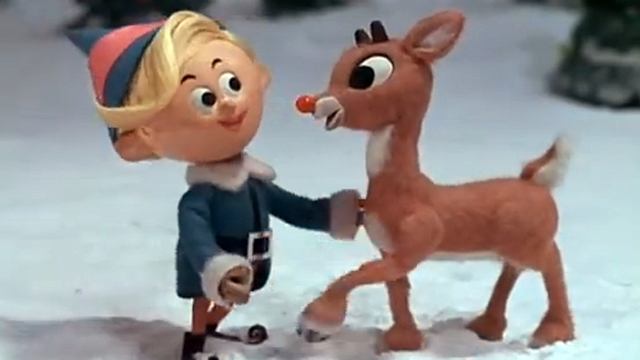
Now, I know what you're thinking: Tony Bravo, you think everything is a gay allegory. In the past, I've pointed to the X-Men (mutant powers manifesting at puberty that require a coming out process and results in discrimination), Twilight's gym queen werewolf, Morrissey-looking vampire and sulky girl in flannel (technically, the books are a Mormon allegory for waiting until marriage, but the movies are totally a gay allegory), Maria von Trapp (the musical version, not the historical one), and even the Little Mermaid. But Rudolph is special. Not only is our red-nosed friend a seasonal gay allegory, but he's one that generations of children have grown up with, through the song (gay) and the stop-motion Rank and Bass special that plays every year on an ABC Family loop (extremely gay). For our purposes, let's dissect the 1964 television special; it is, after all, a classic.
- Folk Singer Burl Ives opens and closes Rudolph and occasionally interjects a song as narrator "Sam the Snowman." Sam the Snowman wears a very Commes Des Garcons-looking plaid vest (hmmmm) and sounds exactly like Burl Ives as Big Daddy in Cat on a Hot Tin Roof. The fact that I can immediately tie this special to a Tennessee Williams masterwork already lets you know just how gay this is going to get.
- Reindeer Donner's wife (she doesn't get a name so we'll just call her Mrs. Donner) starts the story properly by giving birth to a pretty, slightly feminine fawn (voiced by actress Billie Mae Richards) that the Donners name Rudolph. Mr. Donner struts proudly with the thought that his masculine legacy of pulling Santa's sleigh will live on, when suddenly, little Rudolph's nose starts to glow bright red. Donner recoils in horror like so many fathers when their sons first express an interest in fashion design or musical theater, but Mrs. Donner shrugs and says, "I guess we'll just have to overlook it." Not exactly a declaration of love and acceptance, but she's one of the few members of Santa's conformity village that are nice to the poor kid.
- Just when he could do the most good, Santa enters the scene and does the most harm. Observing that Rudolph is smart (he's a newborn fawn that properly identifies everyone by name), Santa too recoils when Rudolph's red nose starts to glow. "I'm sure he'll grow out of it, Santa," Donner immediately apologizes, ashamed that his fey and different little fawn embarrassed him in front of the boss. "He'll have to, if he wants to join the sleigh team!" And with that, Santa goes on his merry way, now that he's basically given Donner and all the other reindeer carte blanche to torment our little red-nosed LGBT youth allegory. Every time I watch the special, it occurs to me that Santa could have sent this story in an entirely different direction if he said, "Donner, don't apologize for the kid. The nose is part of who he is" and then pulled a stop-motion Lady Gaga out of his sack to sing "Born This Way."
- Deeply ashamed of his red-nosed son, Donner covers his nose with some convenient dirt so he can be "a normal little buck." That's sort of like when fathers of gay sons insist on giving them a football for Christmas instead of the One Direction calendar they asked for so they "will have something in common with the boys on the playground." Rudolph's shameful nose hidden, Donner can finally hug his son -- but it's a false love. When Mrs. Donner gives her son a kiss, his nose happily blinks bright red and you get the feeling things haven't entirely been resolved.

